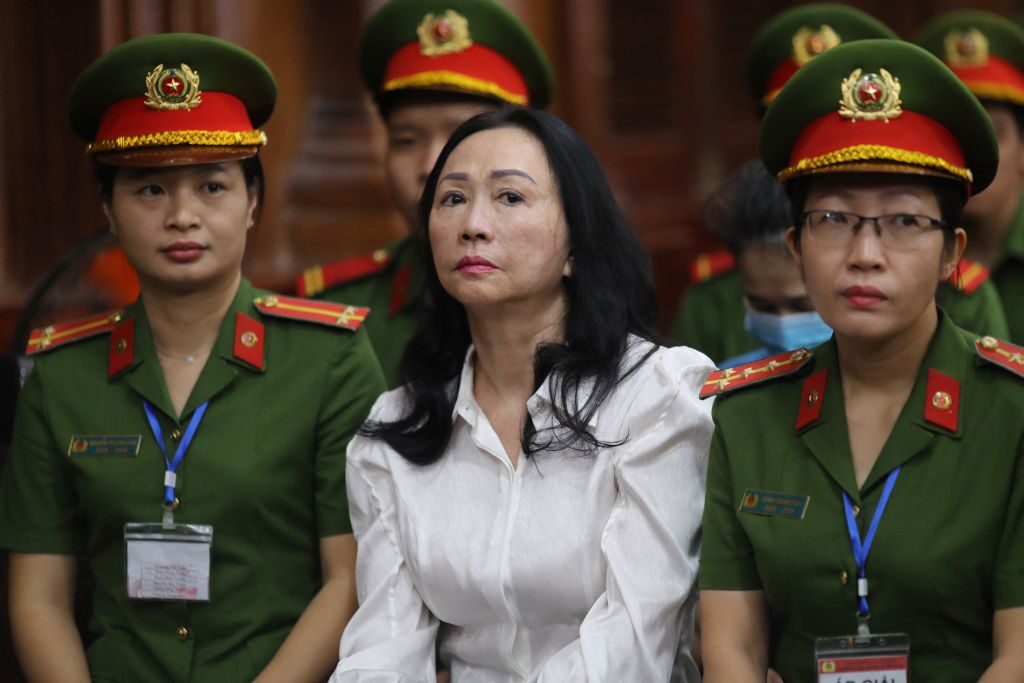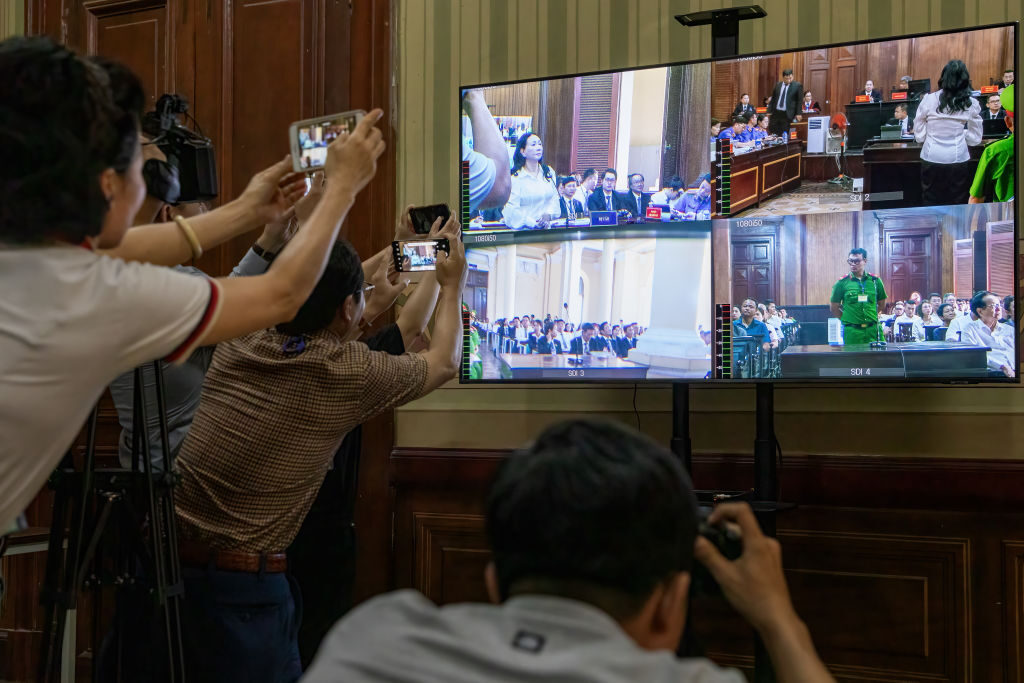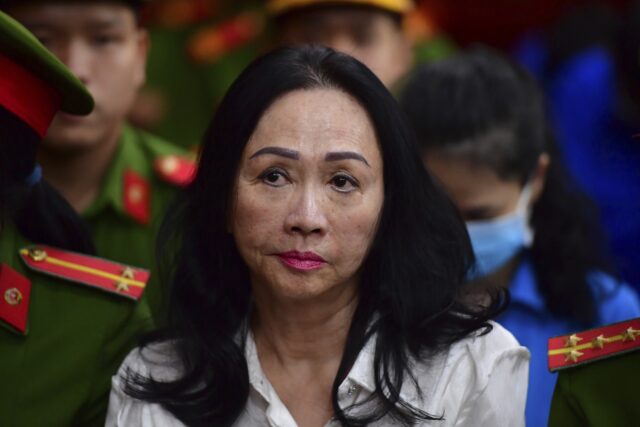A court in Ho Chi Minh City rushed on Thursday to sentence real estate tycoon Truong My Lan, one of the richest women in the world, to death for her part in a $12.5 billion fraud case.
The verdict and sentence were delivered surprisingly early in the trial, which was the greatest courtroom spectacle in Vietnam’s history.
Lan, 67, is a Chinese-born billionaire who rose from humble origins as a cosmetics vendor to build a real estate empire after Vietnam’s economic reforms in the 1980s. She established the Van Thinh Phat company in 1992, the same year she married Hong Kong investor Eric Chu Nap-kee, and quickly amassed a vast portfolio of hotels, restaurants, and shopping malls. To this day, the company owns most of the luxury properties in Ho Chi Minh City – or at least it did until the court seized over 1,000 properties owned by Lan.
All land in Vietnam is technically owned by the Communist regime, so even when the economy was “liberalized” by “market reforms,” close ties to a phalanx of government officials were necessary to become successful in real estate. Almost all of Vietnam’s first wave of market-reform millionaires were people like Lan who convinced Communist officials to let them buy and sell real estate.
Lan became so respected and influential that the Vietnamese Communist Party gave her an oversight role in a massive 2011 bank merger. According to prosecutors, she proceeded to use the revamped Saigon Joint Commercial Bank (SCB) as her personal piggy bank, milking it for billions by creating “ghost companies” and using them to secure fraudulent loans for herself and her cronies.
Lan and her 85 co-defendants were accused of swindling $12.5 billion from the SCB, but prosecutors said their activities caused over $27 billion in damage to the bank and Vietnam’s financial system, which is equivalent to about seven percent of Vietnam’s Gross Domestic Product (GDP).
By subscribing, you agree to our terms of use & privacy policy. You will receive email marketing messages from Breitbart News Network to the email you provide. You may unsubscribe at any time.

Vietnamese property tycoon Truong My Lan (C) looks on at a court in Ho Chi Minh city on April 11, 2024. (STR/AFP via Getty Images)
Vietnamese law prohibits any single individual from owning more than five percent of any given bank, but Lan allegedly skirted around that restriction by creating a vast network of shell companies and proxy shareholders. Prosecutors said that by the time she was finished looting SCB, she controlled over 91.5 percent of its shares and 93 percent of its loans were made to her “ghost companies.”
Perhaps even more damaging were the charges that Lan and her co-conspirators paid huge bribes to Vietnamese officials to protect their embezzlement scheme. This brought the case to the attention of “Blazing Furnace,” the massive anti-corruption purge launched in 2016 by Vietnam’s authoritarian ruler, Communist Party General Secretary Nguyen Phu Trong.
Blazing Furnace has already collected some high-profile political scalps, most recently including President Vo Van Thuong, who was removed from office in March. Former central bank official Do Thi Nhan was sentenced to life in prison on Thursday for accepting $5.2 million in bribes from Lan’s embezzlement conspiracy.
Lan’s trial was an astounding spectacle, with hundreds of boxes containing tons of evidence wheeled into a courtroom packed with hundreds of lawyers. The witness list for the trial had almost 2,700 names on it. One of those witnesses was Lan’s driver, who testified that he personally lugged over $4 billion in cash into Lan’s basement over the course of three years.
Vietnamese media broadcast daily images of a fleet of armored vehicles trundling Lan to the courtroom, where platoons of security officers waited to usher her inside. Trials in Vietnam are usually secretive, but the Communist government made this one as public as possible.
“There has never been a show trial like this, I think, in the communist era. There has certainly been nothing on this scale,” former U.S. State Department official David Brown mused to the BBC on Thursday.
Lan tried to play the public relations game, abandoning her image as a glamorous feminist success story to appear in court looking haggard and unkempt. She claimed all of her alleged crimes were merely mistakes made due to her “lack of understanding of legal matters.” Her lawyers pointed to her long history of charitable activities, and her previously clean legal record, to ask for leniency.
Instead, the court moved with astonishing speed to declare Lan guilty and sentence her to death, a rare sentence for women in Vietnam, especially first-time offenders. The public followed her trial with rapt fascination and growing anger – although one reason she was so quickly sentenced to death might be anxiety among Communist officials that the public is equally angry at them.
Vietnamese social media is buzzing with people asking how a high-profile woman could have run such a gigantic fraud and bribery scheme for a decade without anyone in their overbearing collectivist government noticing, even given that Lan allegedly paid off some regulators. Like any Communist regime, Vietnam is positively swarming with government officials and not even Truong My Lan could afford to bribe them all.

Members of the media take photographs and video footage of court proceedings with Truong My Lan, chairwoman of Van Thinh Phat Holdings, featured on a television screen at the Ho Chi Minh City People’s Court in Ho Chi Minh City, Vietnam, on Tuesday, March 5, 2024. (Maika Elan/Bloomberg via Getty)
Continue reading: Breitbart.com





Leave a Reply